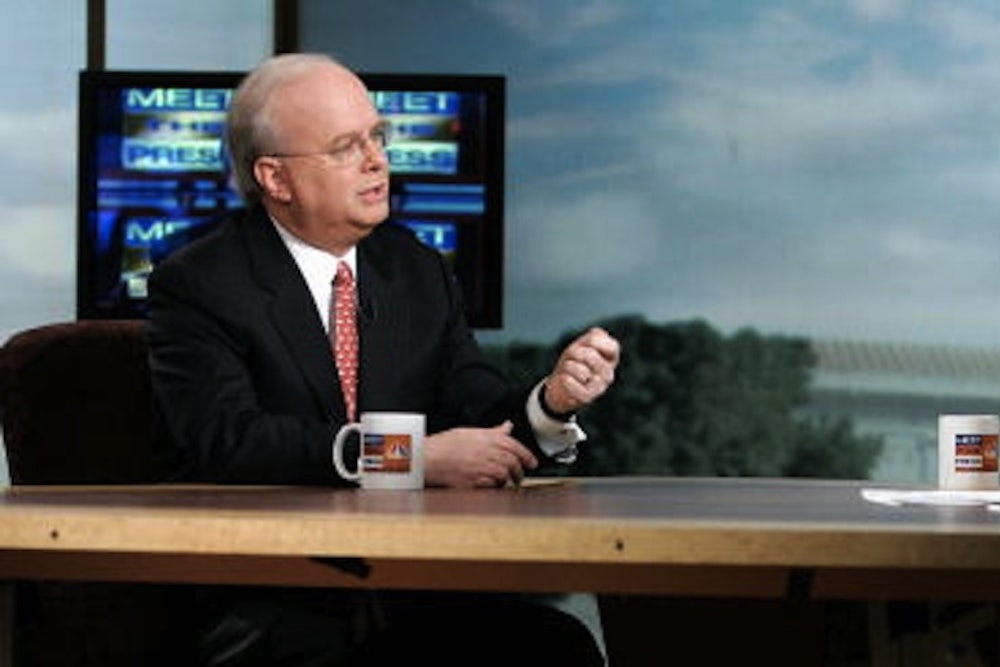Obamacare’s architects get very little credit for crafting a fiscally responsible law. And that’s a shame, because the Administration and its allies accepted lots of unpleasant compromises—and endured lots of political pain—in order to create a law that the Congressional Budget Office would certify as reducing the deficit.
Just to take one example, the Democrats who crafted the Affordable Care Act eventually scaled back the law's tax credits and reduced the number of people eligible for them. That decision meant the government would spend less money. It also meant people would end up paying more for their insurance—giving the law’s critics even more opportunities to scream about “rate shock” and the injustice of it all.
It’s frustrating enough when people fail to appreciate this—and suggest the law is likely to raise the deficit. But it's positively maddening when these complaints come from Karl Rove, as they did the other day when he wrote another opinion article for the Wall Street Journal:
Then there’s Medicare, whose Hospital Insurance Trust Fund will go bankrupt in 2026. For five years, Mr. Obama has failed to offer a plan to restore Medicare’s fiscal health as he is required by the law establishing Medicare Part D. When Medicare goes belly-up, he will be out of office.
For starters, the idea that Obama has “failed to offer a plan to restore Medicare’s fiscal health” is just wrong. Obama has put forth multiple proposals for reducing Mediare spending, most recently with his 2014 budget. And that’s on top of the more sweeping changes that The Affordable Care Act made to Medicare. Those changes are a big reason why the Trustees now project the Hospital Fund will remain solvent until 2026. When Obama took office, they had projected the Fund would run out of money in 2017.
More important, the administration’s determination to pay for its huge health care initiative stands in stark contrast to the effort that preceded it: the creation of Medicare Part D, the drug benefit for seniors that the Bush Administration crafted, pushed through Congress, and signed into law in 2003. At the time, estimates suggested the program would cost hundreds of billions of dollars over the ensuing decade. Bush Administration officials decided against trying to offset the cost with spending cut or new revenue. As a result, the CBO ended up predicting Medicare Part D would increase the deficit by a little less than $400 billion in the first decade. And when a government actuary warned it might cost even more, his superiors in the administration threatened disciplinary action and suggested they might fire him.
Rove knows all about this, because he was there—as senior counselor to the president. Of course, this is not the first time Rove has accused Democrats of precisely the sort of misbehavior for which he and his former Bush Administration colleagues became famous. Just ask MSNBC’s Steve Benen, who has been documenting Rove's habit of projection for some time:
* Rove has tried to buy elections, so he accuses Democrats of trying to buy elections.
* Rove has relied on scare tactics, so he accuses Democrats of relying on scare tactics.
* Rove embraced a permanent campaign, so he accuses Democrats of embracing a “permanent campaign.”
* Rove relied on pre-packaged, organized, controlled, scripted political events, so he accuses Democrats ofrelying on “pre-packaged, organized, controlled, scripted” political events.
* Rove snubbed news outlets that he considered partisan, so he accuses Democrats of snubbing news outlets that they consider partisan.
* Rove had a habit of burying bad news by releasing it late on Friday afternoons, so he accuses Democrats of burying bad news by releasing it late on Friday afternoons.
